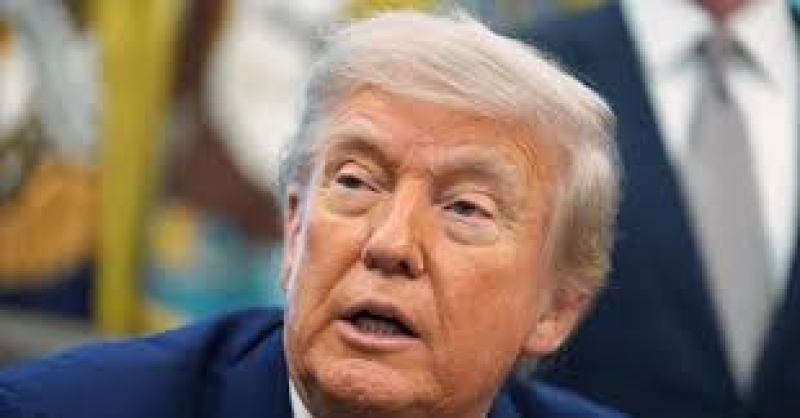- India Sees 9% Drop in Foreign Tourists as Bangladesh Visits Plunge |
- Dhaka Urges Restraint in Pakistan-Afghan War |
- Guterres Urges Action on Safe Migration Pact |
- OpenAI Raises $110B in Amazon-Led Funding |
- Puppet show enchants Children as Boi Mela comes alive on day 2 |
Trump Inks Orders to Boost Nuclear Power, Speed up Approvals

President Donald Trump signed a series of executive orders on Friday aimed at dramatically increasing the U.S. nuclear energy output—by up to four times over the next 25 years—a target energy experts say is highly unlikely.
The orders shift key decision-making powers from the Nuclear Regulatory Commission (NRC), the longstanding independent safety body, to the Department of Energy, allowing the energy secretary to fast-track approvals of advanced reactor designs and projects.
The move comes amid growing energy demand driven by artificial intelligence and the rapid expansion of data centers, which are putting immense pressure on the nation’s electric grid.
Interior Secretary Doug Burgum said, “What we do over the next five years with electricity will shape the next 50,” emphasizing the urgency of energy expansion to maintain a competitive edge with China in AI development.
Still, the goal of quadrupling nuclear output is seen as unrealistic. The U.S. has no operational next-generation reactors, and only two new reactors have been built in the past five decades—both plagued by years of delays and massive cost overruns.
Currently, the U.S. operates 94 nuclear reactors, providing about 19% of the country’s electricity. Fossil fuels account for around 60%, while renewables contribute about 21%, according to the Energy Information Administration.
Trump Promotes Nuclear at Oval Office Ceremony
During the signing event in the Oval Office, President Trump, flanked by energy industry leaders, called nuclear power “a hot industry” and pledged large-scale development. Burgum and others argued that excessive regulation has stifled nuclear innovation for decades.
“This marks the end of over 50 years of overregulation,” said Burgum, who heads Trump’s new Energy Dominance Council.
The orders propose restructuring the NRC to ensure faster project reviews, including setting an 18-month deadline for decisions. They also launch a pilot program to build three experimental reactors by July 4, 2026, and use the Defense Production Act to secure uranium and other critical fuels.
Additional directives include evaluating the reopening of closed nuclear plants and locating new reactors on federal and military land.
NRC spokesperson Scott Burnell said the agency is reviewing the orders and will comply with White House instructions.
Industry Reacts with Optimism
Jacob DeWitte, CEO of nuclear company Oklo, demonstrated nuclear efficiency to Trump by holding up a golf ball—symbolizing the amount of uranium needed to power a person’s lifetime energy use. “It doesn’t get any better than that,” he said. “Very exciting indeed,” Trump responded.
Although Trump has previously backed fossil fuel expansion, he praised nuclear energy for being safe and clean—though he didn’t mention its climate advantages. Nuclear energy produces no greenhouse gas emissions, but safety advocates note the risks of accidents, attacks, and unresolved nuclear waste storage.
The proposed NRC overhaul includes workforce reductions but stops short of removing the current NRC commissioners. The future of the agency’s current chair, David Wright, remains uncertain as his term ends in June.
Criticism from Safety Advocates and Former Officials
Critics say Trump’s orders could erode critical safety protections. Edwin Lyman of the Union of Concerned Scientists warned that bypassing or weakening the NRC could threaten public safety. “The U.S. nuclear industry will fail if safety isn’t prioritized,” he said.
Former NRC Chair Gregory Jaczko was even more blunt, likening the orders to “a guillotine to the nation’s nuclear safety system,” and accused Trump of making the industry more dangerous and unreliable.
Push for Innovation Amid Global Competition
Nations like Russia, China, and Canada are advancing rapidly in building next-generation reactors. In Canada, the first of four small modular reactors recently began construction. Meanwhile, the U.S. is working to modernize its own approval processes.
Isaiah Taylor, CEO of Valar Atomics, said excessive bureaucracy has slowed U.S. progress while global rivals move faster. He welcomed the new mandate for the Department of Energy to accelerate innovation.
The NRC is currently evaluating applications for small modular reactors, with plans for some to begin operating in the early 2030s. The agency expects its reviews to be completed in under three years, reports UNB.
Tori Shivanandan, COO of California-based Radiant Nuclear, called Trump’s executive orders a “watershed moment” for the U.S. nuclear industry, expressing confidence they will drive the sector’s success.

